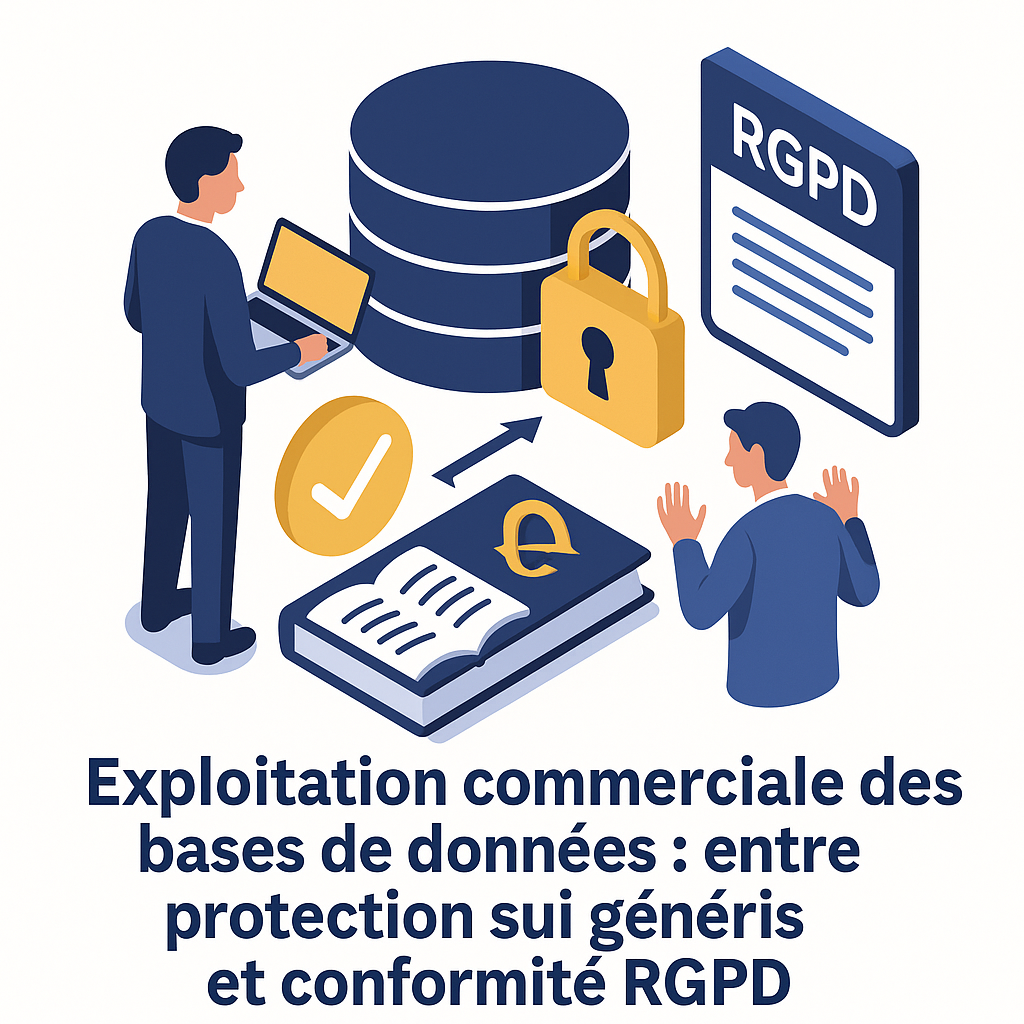In today's digital economy, databases are a major strategic asset for companies. These structured sets of information, the fruit of often considerable investment, represent a growing commercial value that organizations are legitimately seeking to monetize.
However, thecommercial exploitation of databases falls within a complex legal framework, at the crossroads of intellectual property law and personal data protection law. Mastering these two aspects is now essential if you are to develop a commercialization strategy that is both effective and compliant with the legal framework.
If you're looking for a software and database lawyer, contact me!
The dual legal protection of databases under French and European law
The legal framework surrounding databases has one remarkable feature: the same object can simultaneously benefit from two distinct and complementary protection regimes. This duality, enshrined in European Directive 96/9/EC of March 11, 1996 and transposed into the French Intellectual Property Code, offers enhanced protection, but also requires mastery of the subtleties of each regime.
Copyright protection: rewarding originality
The first, classic form of protection comes under copyright law. It applies when the structure of the database - its selection or the arrangement of its constituent elements - is original, reflecting the personality of its author. This originality lies not in the data itself, but in the way it is organized, arranged or selected.
This protection confers on its holder the usual prerogatives of copyright: moral rights (in particular the right to paternity) and economic rights (reproduction, representation, adaptation) for a period corresponding to the life of the author plus 70 years after his death. It is acquired automatically, without any particular formality, as soon as the database is created, provided it meets the criterion of originality.
In practice, this requirement of originality can prove difficult to establish, particularly for technical or professional databases whose structure often responds to functional imperatives leaving little room for creativity. Courts are generally restrictive in their assessment of this criterion, limiting the effective scope of protection for many commercial databases.
The producer's sui generis right: protecting investment
Faced with the limitations of copyright, the European legislator has created a second specific protection regime, known as sui generis, designed to protect the substantial investment made by the database producer, independently of any originality. This right, codified in Articles L.341-1 et seq. of the French Intellectual Property Code, represents a major innovation in the legal landscape of intellectual property.
The sui generis right protects against the extraction or reuse of all or a qualitatively or quantitatively substantial part of the database content. It thus confers on the producer - the natural or legal person who takes the initiative and the risk of investment - a monopoly of exploitation over the content of the database.
To benefit from this protection, the producer must demonstrate a substantial investment, whether financial, material or human, in obtaining, verifying or presenting the content. The case law of the Court of Justice of the European Union has clarified that investment in the creation of the data itself cannot be taken into account, as only investment in the creation of the database is relevant. This subtle but fundamental distinction may prove problematic for databases whose producer is also the creator of the data they contain.
The initial term of protection is 15 years from the date of completion of manufacture of the database, but any substantial new investment in updating the database triggers a renewal of this protection. In practice, this mechanism provides potentially perpetual protection for databases that are regularly updated, as is the case for most commercial databases.
The specific challenges of database marketing
There are many different ways of monetizing a database, each of which raises specific legal issues. The most common business models include licensing, the provision of value-added services based on data, or indirect monetization via targeted advertising.
Licensing contracts: the cornerstone of commercial exploitation
Licensing is the most traditional form ofcommercial exploitation for databases. These contracts precisely define the rights granted to the licensee, their limits, and the associated financial considerations. Several aspects deserve particular attention when drawing up such contracts:
- Precise delimitation of the scope of authorized use (consultation, extraction, reuse)
- Applicable geographical and time restrictions
- Technical access to the database
- The exclusive or non-exclusive nature of the rights granted
- Sublicensing and redistribution possibilities
- Mechanisms for controlling and auditing compliance with conditions of use
- Guarantees of data quality and lawfulness
These contracts must also specify whether the license concerns the structure of the database (protected by copyright), its content (protected by sui generis rights), or both, as this distinction directly influences the scope of the rights granted and the associated valuation.
Pricing models: reflecting value without inhibiting use
Defining the pricing model is a delicate exercise, as it has to reconcile a fair return on investment with sufficient commercial appeal. Several approaches are possible:
A fixed price for access to the entire database, adapted to uses involving regular consultation of all data.
Volumetric pricing based on the quantity of data consulted or extracted, particularly relevant for one-off or specific uses.
A recurring subscription model, guaranteeing ongoing access to a regularly updated database and a predictable revenue stream for the producer.
Differentiated pricing according to the purpose of use, distinguishing for example between internal, commercial or academic use, with financial conditions adapted to each category.
These models can be combined or modulated according to the specific features of the target market and the nature of the data sold. Whichever approach is chosen, the contract should provide for transparent and balanced tariff evolution mechanisms to adapt to market conditions.
Producer liability: an often underestimated issue
Thecommercial exploitation of a database engages the responsibility of its producer on several levels. The accuracy, completeness and updating of data are obligations that vary in intensity according to the nature of the database and the use made of it. This liability may be contractual, with respect to licensees, or tortious, with respect to third parties who may suffer prejudice as a result of using the data.
Licensing contracts generally include clauses limiting or exonerating liability, the legal effectiveness of which largely depends on their proportionality and the status of the contracting party (professional or consumer). These clauses must be carefully calibrated to offer real protection to the producer, without going too far and rendering them unenforceable.
To limit these risks, a rigorous data quality control policy and precise documentation of recommended usage limits are essential preventive measures. It may also be advisable to take out specific insurance covering the risks associated with thecommercial use of data for databases with significant stakes.
The marketing of databases raises complex legal issues, at the intersection of intellectual property law and the protection of personal data. A software and database lawyer will be able to advise you on the optimum strategy for adding value to your data assets while complying with the legal framework.
The delicate articulation with the RGPD: compliance and enhancement
The presence of personal data within a commercialized database raises major regulatory issues, particularly since the General Data Protection Regulation(GDPR) came into force. This fundamental text does not prohibit thecommercial exploitation of personal data, but frames it strictly by a set of principles and obligations that directly impact the methods of valorization.
The legal status of players: essential clarification
The first step is to determine the precise status of each participant in the value chain. The database producer marketing personal data generally acts as data controller, while the licensee may be qualified either as a separate data controller (if it determines its own purposes of use), or as a subcontractor (if it processes the data on behalf of the producer).
This qualification is decisive, as it conditions the respective obligations of the parties and the contractual structure to be put in place: a licensing agreement supplemented by specific clauses relating to data protection in the former case, or a subcontracting agreement in compliance with Article 28 of the RGPD in the latter. In all cases, the roles and responsibilities of each party must be explicitly defined and documented.
Legitimacy of processing: the basis of all exploitation
The marketing of a database containing personal information cannot be envisaged without ensuring the lawfulness of the processing. Among the six legal bases provided for by the RGPD, two are particularly relevant in this context:
The consent of the persons concerned, which must be free, specific, informed and unambiguous. While this legal basis offers considerable legal certainty, it has the major drawback of being revocable at any time, creating potential instability in the operation of the database.
The data controller's legitimate interest, which needs to be balanced against the fundamental rights and freedoms of the data subjects. This more flexible legal basis does, however, require enhanced documentation, notably through a Data Protection Impact Assessment (DPIA) for large-scale processing operations.
Whatever the legal basis, the purpose principle requires that data be used only for purposes compatible with those initially communicated to the data subjects. This constraint can significantly limit the potential for re-using data in multiple or evolving commercial contexts.
The rights of data subjects: anticipating operational management needs
The RGPD grants individuals extensive rights over their personal data: access, rectification, erasure, limitation, portability and opposition. Exercising these rights can have a direct impact on the commercial value of a database, particularly in the case of a right to erasure or opposition that would reduce the volume of usable data.
The marketing of a database containing personal data must therefore be accompanied by robust operational processes enabling :
- Respond effectively to requests to exercise rights within the legal timeframe
- Circulate modifications or deletions to all licensees concerned
- Maintain full traceability of the processing carried out on each data item
- To proactively inform data subjects in accordance with Articles 13 and 14 of the RGPD.
Ces contraintes opérationnelles doivent être intégrées dès la conception de la stratégie commerciale et des outils techniques associés, selon l’approche “Privacy by Design” promue par le règlement. L’accompagnement d’un avocat spécialisé en protection des données est essentiel pour mettre en place ces processus conformes.
Optimization strategies for compliant, profitable operation
Faced with the legal complexity ofcommercial exploitation of databases, several approaches can be adopted to maximize their value while ensuring regulatory compliance.
Anonymization and pseudonymization: strategic levers
Complete anonymization of data, where technically feasible, takes data outside the scope of the RGPD, offering considerably greater freedom of exploitation. To be legally valid, this anonymization must be irreversible, making it impossible to re-identify data subjects, even by cross-checking with other available sources of information.
This strict requirement is difficult to meet in practice, particularly for databases rich in descriptive attributes. A more accessible alternative is data pseudonymization, which maintains the possibility of re-identification but significantly reduces the risks for data subjects. Although still subject to the GDPR, pseudonymized data benefits from a more flexible operating framework, particularly in terms of compatible purposes and retention periods.
The combination of partial anonymization (for the most sensitive data) and pseudonymization (for attributes requiring traceability) can be an effective compromise, preserving the analytical value of the database while reducing the compliance burden.
License agreements adapted to the RGPD context
The contractual framework for the marketing of a database containing personal information must incorporate specific clauses meeting the requirements of the RGPD. Essential provisions include:
- The precise legal status of the parties and the allocation of their responsibilities
- Authorized purposes and expressly prohibited processes
- Technical and organizational security measures required of the licensee
- Data breach management and notification requirements
- Audit and compliance procedures
- Guarantees concerning the exercise of data subjects' rights
- Conditions for transferring data outside the European Economic Area
Ces clauses doivent être adaptées à la nature des données, à l’écosystème technique et à la relation commerciale envisagée. Leur conception nécessite une expertise juridique spécifique, au carrefour du droit des contrats, de la propriété intellectuelle et de la protection des données. Un avocat spécialisé en droit du numérique peut vous accompagner dans cette démarche.
Alternative business models: rethinking the value of data
In the face of growing regulatory constraints, new value-adding models are emerging, favoring controlled access to data rather than direct transfer. These approaches include :
Secure APIs enable the database to be queried without accessing its raw content, thus reducing the risks associated with uncontrolled duplication of personal data.
Sandbox analysis environments, where customers can exploit data without extracting it, within a technical framework controlled by the producer, who thus maintains effective control over his database.
Data enrichment services, where only the result of the processing is provided to the customer, without transmission of the underlying personal data used to generate this result.
The marketing of aggregated, anonymized insights, exploiting the collective value of data without exposing individual information.
These models, although sometimes more technically complex to implement, have the advantage of greater compatibility with the principles of data minimization and purpose limitation carried by the RGPD.
International challenges and cross-border transfers
Thecommercial exploitation of databases often takes place in an international context, raising specific questions of applicable law and data transfer.
Territorial applicability of legal protection
Database protection regimes vary considerably from one jurisdiction to another. While sui generis rights have been harmonized within the European Union, they do not exist, or exist in very different forms, in many non-EU countries. In the United States in particular, protection is essentially based on copyright (equivalent to authors' rights), with sometimes less stringent originality criteria, supplemented by contractual mechanisms and protection against misappropriation.
This diversity calls for a protection strategy tailored to each operating area, ideally combining :
- Legal protection available locally
- Robust contractual mechanisms to complement or replace exclusive rights
- Technical measures to protect against unauthorized extraction
- Active market surveillance to detect illicit uses
For internationally exploited databases, a precise mapping of the rights recognized in each jurisdiction should guide the commercial and pricing strategy, with potentially differentiated conditions depending on the effective level of legal protection.
International transfers of personal data
For databases containing personal data, their marketing outside the European Economic Area comes up against the restrictions imposed by the RGPD on international transfers. Since the invalidation of the Privacy Shield by the "Schrems II" ruling of the Court of Justice of the European Union, these transfers to third countries that do not benefit from an adequacy decision are proving particularly complex.
The legal mechanisms available mainly include :
- The standard contractual clauses adopted by the European Commission, which must now be accompanied by an assessment of the level of protection offered by the recipient country, and additional measures if necessary.
- Binding corporate rules for intra-group transfers, with a lengthy and costly approval process
- The derogations provided for in Article 49 of the RGPD, including explicit consent, usable only for non-mass, occasional and necessary transfers
The growing complexity of these mechanisms may justify data localization strategies, consisting of duplicating the database in different regions and limiting cross-border transfers, despite the additional operational costs involved.
Towards a strategic approach to data asset valuation
Thecommercial exploitation of databases now requires a global approach, simultaneously integrating legal, technical and commercial dimensions. This holistic vision makes it possible to transform regulatory constraints into competitive advantages, and maximize the value extracted from investments made in building and maintaining databases.
Due diligence: the foundation of a solid strategy
Before any marketing approach, a complete audit of the database is required to identify :
- Components protected by copyright and/or sui generis rights
- The presence and sensitivity of personal data
- Data sources and lawfulness of data collection
- Documentable investments
- Specific legal risks
- Valuation potential according to different models
This initial assessment enables us to draw up a realistic and compliant sales strategy, adapted to the specific characteristics of the base and its legal environment.
Data governance: a prerequisite for added value
The implementation of structured data governance is a key success factor for thecommercial exploitation of databases. This governance must cover the entire data lifecycle, from data collection to enrichment, updating, exploitation and deletion.
Rigorous documentation of processes, data flows and protection measures implemented facilitates the demonstration of compliance required by the RGPD accountability principle. This transparency also strengthens the trust of business partners and end users, which has become a differentiating factor in a market that is increasingly sensitive to ethical and regulatory issues.
The ethical dimension: beyond legal compliance
Over and above strict compliance with legal obligations, thecommercial exploitation of databases raises ethical issues that are becoming a distinctive feature. A responsible approach to data enhancement can include :
- Greater transparency on data sources and quality
- Fair sharing of value with contributors or stakeholders
- Particular vigilance with regard to potential biases in the data
- Consideration of the societal impact of encouraged uses
These considerations, initially perceived as additional constraints, are gradually revealing themselves as commercial assets in a context of growing awareness of the issues linked to data exploitation.
Turning constraints into strategic opportunities
The complex legal environment surrounding thecommercial exploitation of databases may seem restrictive at first glance. However, this very complexity creates barriers to entry which, for players with a thorough grasp of the regulatory intricacies, can be transformed into significant competitive advantages.
RGPD compliance, often perceived as a burden, is now a decisive selling point, particularly for institutional or regulated customers. The ability to demonstrate effective protection of intellectual property rights similarly reassures partners about the sustainability and legitimacy of the offering.
Investment in a rigorous legal structure for thecommercial exploitation of databases should not be seen as a cost of compliance, but as a strategic investment in the construction of an asset that can be valued over the long term, protected both by legal mechanisms and by the operational excellence of its management.




